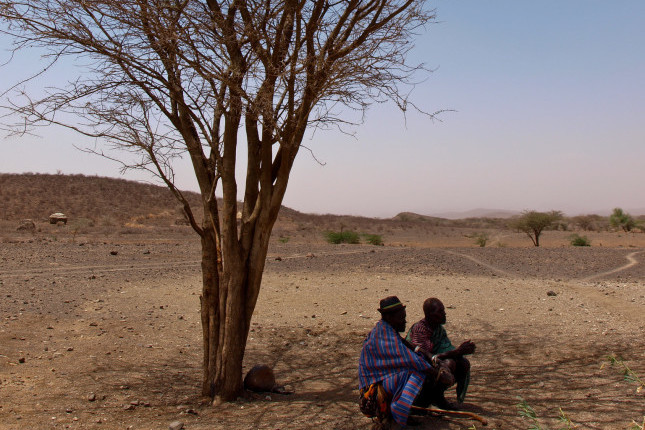-
Defying Boundaries: Using Climate Risks to Forge Cross-Border Agreements
October 16, 2019 By Brigitte Hugh
Climate change is a risk, said Maurice Amollo, a Mercy Corps Chief of Party in Nigeria Mercy Corps. “But it is also an opportunity if people come together.” He spoke at a recent USAID Adaptation Community Meeting, “Tackling the threat multiplier: Addressing the role of climate change in conflict dynamics.” The discussion focused on USAID’s Peace III initiative that Amollo and Mercy Corps implemented in the Karamoja region along the borders of Kenya, Ethiopia, Somalia, and Uganda, where climate and conflict shocks are part of daily life for pastoralist ethnic groups. Addressing climate and conflict issues in these regions will require using the environment to build cooperation and peace, said Eliot Levine, the Director of Mercy Corps’ Environment Technical Support Unit.
Environmental Peacebuilding
The Peace III Initiative was implemented in the Horn of Africa by USAID and Mercy Corps to advance conflict management by improving connections between communities and local government and enhancing institutions’ ability to respond to conflict. The initiative was based on two assumptions. According to Peace III’s theory of change, if it could persuade communities to cooperatively manage scarce resources, then violence would drop. Achieving a peaceful environment would then ease the employment of climate adaptation strategies.
The Peace III initiative sees climate risks, such as increased heat and decreased rainfall supply and reliability, as common threats that are forcing the small, pastoralist communities in the Karamoja region to come together for greater cooperation and coordination. One part of the initiative promotes cooperation around a shared interest such as water-sharing.
Resource-sharing agreements can create new pathways for making a living when climate risks limit traditional livelihoods. Cross-border natural resource sharing agreements between the Kenyans and the Ethiopians have made fishing in Lake Turkana a viable and more prosperous livelihood for some pastoralists, said Amollo.
The initiative also focuses on educating local populations on climate risks. The workshops and curricula introduced by Peace III were meant to build climate knowledge and provide vocabulary and information to help people describe what they observe. For instance, an elderly Ethiopian man was aware that natural resources that existed during his childhood had all but disappeared, said Amollo, but he lacked the knowledge to explain why that change had occurred.
Peace III has also assisted in the development of resource-sharing agreements between communities to help them cope and adapt by agreeing on access norms and recognizing common threats to resources, such as water supply or grazing lands. Amollo described situations in which fights over natural resources are both cyclical and destructive: As fighting over a natural resource continues, the resource may be negatively impacted in supply or availability. “No-go zones,” or rich grazing fields, go unused, said Amollo, because any community that uses them may expect immediate violence from their neighbors. Instead, herders use the same exhausted, overgrazed land and lose animals to starvation. This situation could be avoided if a resource-sharing agreement were implemented.
Those who implemented the Peace III initiative are highly aware that climate problems “defy national boundaries completely,” said Amollo. With Peace III, communities see that conflict is not their only option. They can respond to shared climate threats by bonding over shared interests. Communities that cooperate with each other will not only diffuse tensions over scarce natural resources but also be better positioned to deploy climate adaptation strategies.
Read More:
- In climate change governance and planning, traditional authorities must be consulted.
- South Sudan peacebuilding plans involve heavy consideration of natural resource management.
- Cooperative water agreements and good forecasting are needed to prevent conflict over the Nile’s water supply.
- Positive peace initiatives can help countries navigate climate shocks.
Photo Credit: Turkana herdsmen wait for the rain, August 2011. Photo by Irina Fuhrmann, courtesy of Oxfam.
 A Publication of the Stimson Center.
A Publication of the Stimson Center.



